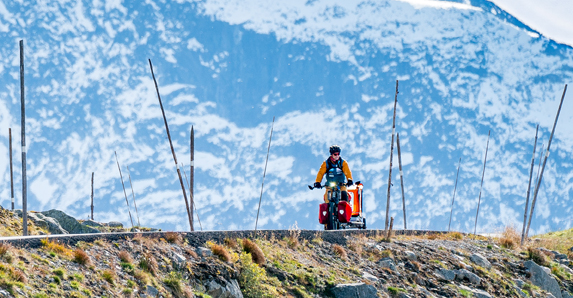
Vapor dome
N 51°44'55.5'' E 072°21'49.5''
Day: 84
Sunrise:
05:52 pm
Sunset:
8:38 pm
As the crow flies:
91.94 Km
Daily kilometers:
104.29 Km
Total kilometers:
9390.18 Km
Soil condition:
Asphalt/poor
Temperature – Day (maximum):
36 °C
Temperature – day (minimum):
16 °C
Latitude:
51°44’55.5”
Longitude:
072°21’49.5”
Maximum height:
338 m above sea level
Maximum depth:
275 m above sea level
Time of departure:
07.30 a.m.
Arrival time:
17.00 hrs
Average speed:
15.98 Km/h
Tanja’s cock crows its wake-up call to us at 5:00 in the morning. I immediately jump up and stifle his annoying croaking by switching off my cell phone. Then we pack our belongings into the Ortlieb bags, have breakfast and move everything outside Gafur’s house. Our bikes are quickly ready to go and we are ready for new adventures. Shortly after 7:00 a.m., Indira and Timur arrive as agreed to show us the way out of the city. We wake up Gafur, who had been drinking vodka with a school friend last night, and say goodbye to him. Still visibly shaken, he stands in front of his house, clad only in his robe. “Thank you so much for your hospitality. We had a great time in your beautiful house,” I thank him, giving him a friendly hug. “It was interesting and enjoyable with you. You are welcome to come back at any time. My doors are always open to you,” he replies with a friendly smile.
We mount our steeds, raise our hands in a final salute and follow Timur’s little minibus. We were immediately enveloped in the enormous dust of Astana’s grotty streets. Although the streets in Kazakhstan, especially in the capital, are dominated by countless super-modern and very expensive cars, the exhaust fumes here are almost indescribable. There is a veritable fog of soot and dust over the metropolis that makes our lungs burn. Many of the drivers even remove their catalytic converters in order to demand more power from their vehicle. We are part of the procession of the moving heaps of metal which, as in every country on our mother earth, are largely responsible for environmental pollution. But it’s not just combustion engines that eject pollutants such as carbon monoxide, nitrogen oxides, volatile organic compounds, suspended particles and even cancer-promoting asbestos into the air we breathe when we brake. Their grotesque-looking black, poisonous soot is spread neatly by the wind over an entire city area.
When we finally reach the outskirts of the city after 20 minutes, the haze around us clears a little. We say goodbye to the helpful Timur with his wonderful sunny disposition and his lovely sister and leave the capital, which is still under construction, behind us. We keep looking back and now, from the increasing distance, we can see how the human settlement in the middle of the flat steppe landscape is shrouded in a nasty-looking bell. In the last century, the Kazakhs were still a nomadic people and roamed their vast country with their animals. Politics and the ravages of time have forced them to move from the steppe to cramped, dirty and unhealthy metropolitan areas. According to the planners, Astana is to become a city of millions. As a result, even more Kazakhs will swap their rural life for stress, hustle and bustle, and the pursuit of money, progress and prestige. I sit thoughtfully on my bike and ask myself when we humans will understand what true happiness is? Certainly not in the constant pursuit of money, prestige and power.
The traffic is surprisingly heavy. Many trucks and cars roar past us. The surface of the dark asphalt strip is rough and coarse. Like an oversized grater. The frames of our bikes, the trailer coupling, the trailers and all our equipment are exposed to enormous stress. It’s a good thing that our bodies are greatly relieved by riese und müller’s fully sprung frames.
Suddenly my cell phone rings. I brake, take the cell phone out of the saddlebag and hear the voice of Marat from Kokchetav. “Hello Marat. Nice to hear from you. You’re lucky to have reached us. I usually switch off my cell phone outside a city,” I say. “How are you?” “Very well.” “Imagine that. The journalist Alia, who wrote the big article about you, came to my apartment yesterday.” “Really? Why?” I ask. “She did an interview about me and my art.” Uh, what art?” I ask cautiously. “Well, my cars and guns bent out of wire! Imagine that! I’ll soon be in the newspaper too!” he exclaims happily. “Fantastic Marat. Congratulations. Maybe we’ll get an entry in the Guinness Book of Records after all,” I reply, knowing that this is his greatest wish. “Yes, maybe. I wish you a good and safe journey. I just wanted to give you the news,” he ends his call.
Smiling, I continued pedaling when we were suddenly stopped by a minibus. Two journalists get out and ask us lots of questions. We patiently answer everything they want to know and let the camera take pictures of us. “We’re writing an article about you. Should we send it somewhere?” “Thank you very much, but unfortunately we don’t have an address in Kazakhstan,” we reply, saying goodbye.
When we find a place to camp after 104 kilometers behind a dense row of bushes, the air is extremely humid. “You could split it with a knife,” says Tanja, “A mighty storm is brewing,” I suspect, studying the sky. “Maybe that’s the reason for my headache,” she replies, putting her things away in the tent.

